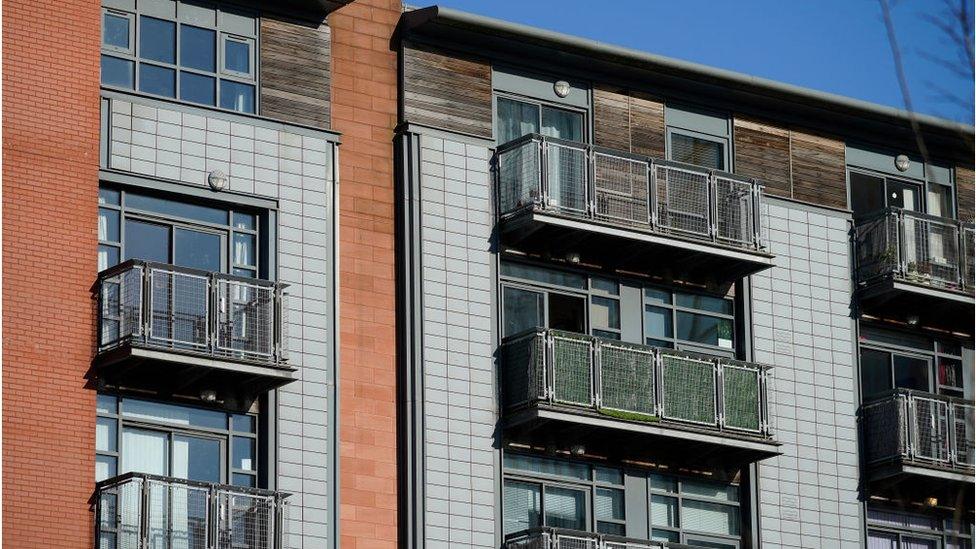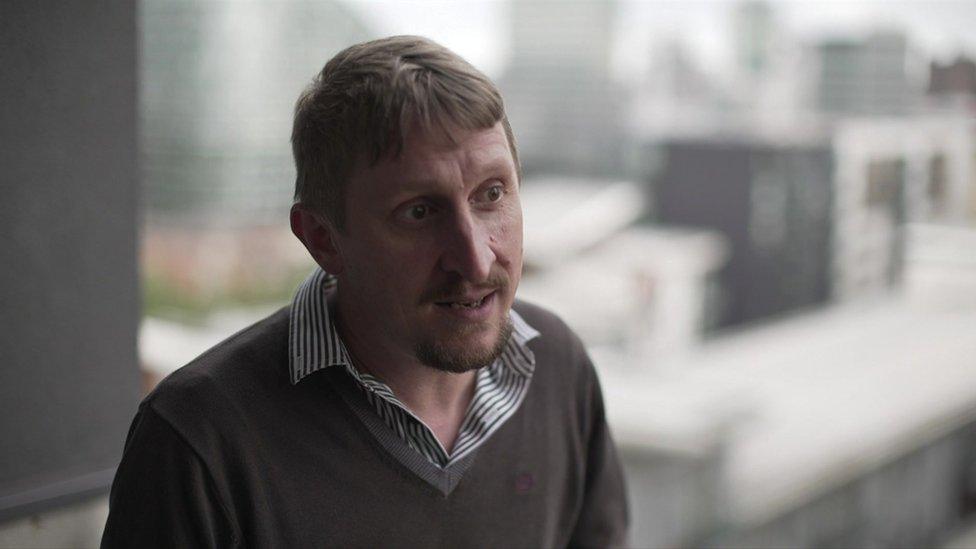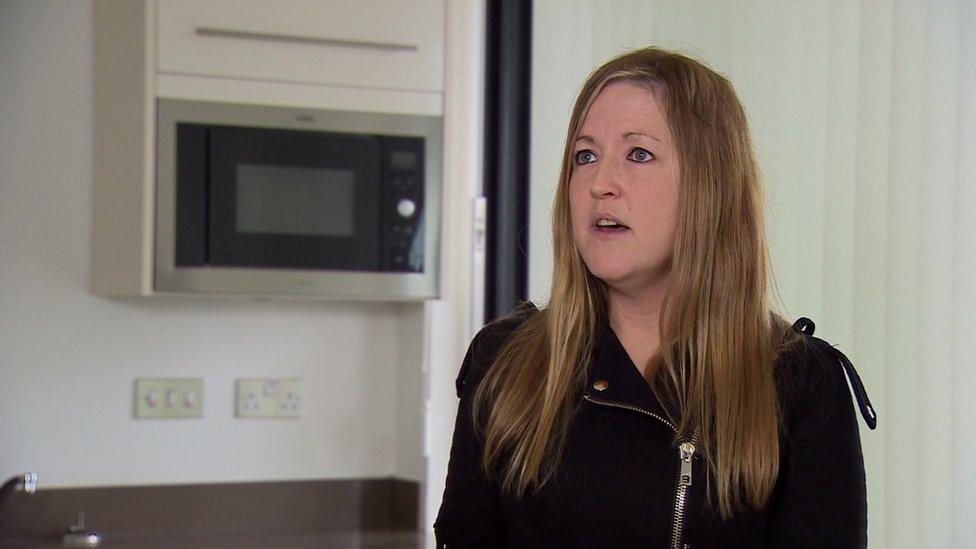Delay removing dangerous cladding ‘soul destroying’
- Published

The government will miss a June deadline to complete applications for £5bn of funding to remove flammable cladding in the wake of the Grenfell Tower tragedy.
The BBC understands most managing agents who administer tower blocks with the cladding are refusing to sign contracts with the government.
Agents say the contracts only cover cladding problems.
This would make them liable for other fire safety defects, they say.
Nigel Glen, head of the Association of Residential Managing Agents (ARMA), which represents hundreds of blocks, said making them responsible for other fire safety faults would "render companies insolvent".
The ongoing dispute is delaying work to make dangerous buildings safe.
"We represents hundreds of blocks in this scheme and none of them have signed. This has major implications and affects hundreds of thousands of people," said Mr Glen.
"We want to start the projects, but by signing that contract the managing agent becomes liable for those costs not covered by funding, and as a director you can't sign anything that as it would put your company technically insolvent," he said. ARMA represents 325 managing agents, who act for freeholders across the UK.

Stephen Squires, and others in his block, has been issued with £20,000 bills.
The deadline for applications to the government's £5.1bn Building Safety Fund is 30 June. The Ministry of Housing, Communities and Local Government (MHCLG) has now said it will allow applications to be processed beyond that deadline on a case by case basis.
A spokesperson for MHCLG said the managing agents' interpretation of the contract is "fundamentally flawed".
Meanwhile leaseholders across the UK said they are stuck in limbo facing life changing bills.
"It's nearly four years since Grenfell, and this building is nowhere near having any works done to make it safe," said Stephen Squires, 42, who lives in a flat with flammable cladding in Manchester's Green Quarter.
"I didn't choose any cladding and now I'm going to be skint forever"
It will cost an estimated £2.7m to make Stephen's flat and the hundreds of others at Britton House safe. The block is eligible for funding but the managing agents HomeGround are disputing the terms.
"The fact that we are so close to funding, and it is being held up, it's soul destroying. We want to get on with our lives. It doesn't matter how much money the government make available unless the agreement is signed we are stuck and trapped. We are stuck in the dark."
"We've all been issued with bills of £20,000 to cover fire alarms and remediation. Until the government funding is in place we have to pay for that," added Mr Squires.
A spokesperson for HomeGround said: "We have been working alongside ARMA, managing agents, other freeholders, as well as engaging with various leaseholder cladding groups who all share our concerns, to explain to MHCLG why these agreements are not workable and cannot be signed in their current form, but the government is yet to address the remaining issues.
'Cost of removing cladding is ripping our lives apart'
"The changes we have proposed are crucial to ensuring that funding can be released to enable remediation work to start and that residents are sufficiently protected from the costs."
'My mental health has been in bits'
Nearly four years since the Grenfell Tower fire which killed 72 people, an estimated 700,000 people are still living in high-rise blocks with flammable cladding. Aside from the financial strain, the cladding crisis is taking its toll on the mental health of those trapped in dangerous buildings.
Alison Hills, 40, bought a one bed flat in St Albans, Hertfordshire, in March 2018 for £300,000. It was financed by the sale of the family home when her mother died. A range of fire safety faults were discovered months later.
"I couldn't sleep. I couldn't eat. My mental health has been in bits. Everything that my father and I ever worked for has been taken away in an instance, and it's not our fault," said Ms Hills.

Alison Hills says: "I couldn't sleep. I couldn't eat."
Opus House, which consists of 44 flats, has problems with cladding, insulation, missing fire breaks and balconies. The estimated remediation bill is £7m but only £1m of that is related to the removal and replacement of the cladding. The government's Building Safety Fund will only cover a fraction of the work needed, but the managing agents, FirstPort, are yet to sign the funding contract.
Ms Hills, who works as a solicitor, warns that if the contract doesn't get signed leaseholders could be liable for £150,000 each.
"It's an absolute disgrace. People are going to become bankrupt. I've had to move out because of the impact on my mental health. You have to sit here in a flammable flat 24 hours a day, especially in lockdown, knowing that you aren't safe," said Ms Hills.
FirstPort said it is doing all it can to support homeowners and residents at Opus House. "The current Building Safety Fund agreement exposes signatories to potential open-ended liabilities they do not otherwise hold, and this is the case for resident management companies, freeholders and managing agents across the country," a FirstPort spokesperson said.
An MHCLG spokesperson said: "This interpretation (of the contract) is fundamentally wrong - the clause relating to other remediation work ensures that the removal of dangerous cladding is not delayed by funding shortfalls."
"It concerns only non-cladding works which applicants choose to carry out, as part of the same project as cladding work covered by Government funding.
"Building safety remains the responsibility of the building owner, and we expect them to cooperate with their contractors to ensure any necessary work is carried out safely, effectively and promptly."

Building Safety Fund - £5.1bn
Privately owned tower blocks:
786 deemed eligible for the fund
366 approved for financial help with their tender or full funding
£460m committed.
(Source - MHCLG)

- Published28 January 2021

- Published20 October 2020
